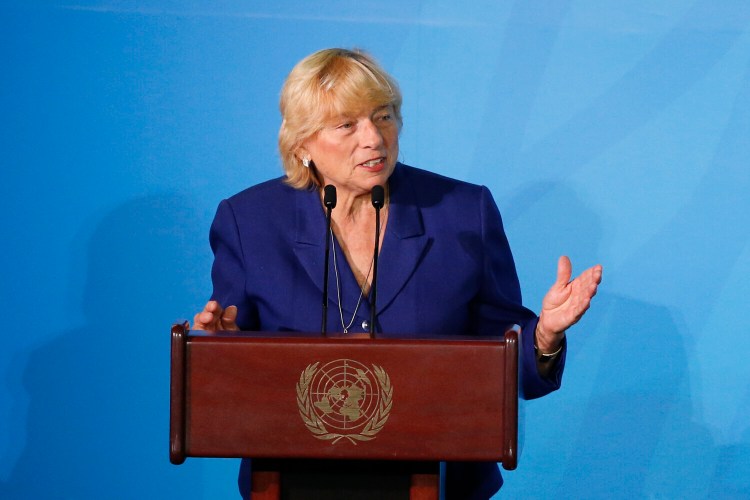Gov. Janet Mills said that while she was at the United Nations Climate Summit on Monday she found herself standing near President Trump’s new U.N. ambassador, Kelly Kraft, and feeling the pain of foreign delegates at the meeting.
Kraft, who is married to a billionaire coal magnate Joe Crafts II of Alliance Resource Partners, has $63 million personally invested in fossil fuel interests, according to her financial disclosures, a fact Mills said she found troubling.
“To think she represents our country in the U.N. while we’re talking about climate change,” Maine’s governor said Tuesday via telephone from New York. “So you can understand other countries’ frustrations when trying to deal with the federal government and why they are looking to the states to work together to save our common planet.”
Mills, who on Monday was the only U.S. elected official to speak at the climate summit, spent Tuesday meeting with foreign officials and fellow U.S. governors on the sidelines of the meeting, looking to share ideas and best practices.
Tuesday morning she met with five high-ranking European climate officials alongside Washington Gov. Jay Inslee – a Democrat who recently withdrew from the presidential race after campaigning almost solely on climate change – and Mary Nichols, chair of the California Air Resources Board.
The participants made no public statements, but Mills told the Press Herald she’d learned about Scandinavian experiences electrifying ferries and Scotland’s large offshore wind sector, while she talked about Maine’s sustainable forest practices and the floating wind platforms being developed at the University of Maine. Her spokeswoman, Lindsay Crete, said participants also reaffirmed their commitments to meet Paris Climate Accord goals and had discussed “trying to raise global ambitions” ahead of the 2020 United Nations Climate Change Conference in Glasgow, where 30,000 delegates will meet in another attempt to craft an international response to the climate crisis.
The European delegation consisted of three top European Union officials: Olva Elvestuen, the E.U. minister for climate and the environment; Maura Petriccione, director general of the European Commission’s Climate Action Directorate; and Miguel Arias Canete, E.U. commissioner for energy and climate action. The United Kingdom’s special envoy for climate, Nick Bridge, and Anders Hoffman, an official at Denmark’s Climate, Energy, and Utilities Ministry, also attended the meeting, which was held at the offices of the E.U.’s diplomatic delegation to the U.N.
The meeting was convened by the U.S. Climate Alliance, a coalition of 24 states and Puerto Rico that seeks to reduce greenhouse gas emissions in accord with the Paris climate treaty that was created after President Trump withdrew the United States from the agreement in 2017. Maine did not join the group until Feb. 28 of this year, after Mills replaced Republican Gov. Paul LePage, who did not favor robust action on climate change.
Crete said E.U. officials at the meeting had “expressed gratitude” to their American counterpart for creating the U.S. Climate Alliance, saying the “coalition of states was a powerful force despite the lack of action out of the White House.”
Mills said she also met Tuesday with counterparts from some of the northeastern states of Brazil who, like her, oppose the backpedaling on climate by their federal government. Like Trump, Brazil’s new leader, Jair Bolsonaro, does not consider climate change a priority; he is accused of tacitly encouraging the recent fires in the Amazon rain forest, which he would like to see opened to development.
On Monday, Mills was the only U.S. elected official to address the U.N. general Assembly’ at the Climate Action Summit, and announced she had signed an executive order directing the Maine Climate Council – a body she created with legislative approval – to provide recommendations on how to make the state a carbon neutral economy by 2045, an initiative that follows previous recent commitments to drastically reduce greenhouse gas emissions in the coming decades.
From the podium, she told world leaders that Maine will not wait to take bold action to address climate change and challenged them to do the same. “We’ve got to unite to preserve our precious common ground, for our common planet, in uncommon ways for this imperative common purpose,” she said. “Maine won’t wait. Will you?”
Mills said it had been “exciting just to be in the General Assembly room” speaking to delegates from around the world. “I felt very privileged to be there and honored that the State of Maine could be represented on the world stage.”
Mills attended another U.S. Climate Alliance event Tuesday afternoon: a panel discussion with five other Democratic governors on how states can address climate change. She was scheduled to appear alongside her counterparts from California (Gavin Newsom), Washington (Inslee), New Mexico (Michele Grisham), Virginia (Ralph Northam) and New Jersey (Phil Murphy).
https://twitter.com/swogden10/status/1176571086445699073
The governor was scheduled to speak Tuesday evening in New York at the premier of a documentary film on how climate change is adversely affecting shellfish growers. The film, “Stories From the Shore,” was produced by the Nature Conservancy and the Shellfish Growers Climate Coalition, an alliance of dozens of shellfish mariculture operators seeking action on climate change.
Maine is at the forefront of climate change because the Gulf of Maine is the second fastest-warming part of the entire world’s oceans. The rapid warming, a side effect of climate change and the Arctic meltdown, is expected to have dramatic effects on the marine ecosystem and the communities that rely on it and is already adversely effecting clammers, aquaculture operations and the recovery of cod stocks.
Send questions/comments to the editors.



Comments are no longer available on this story